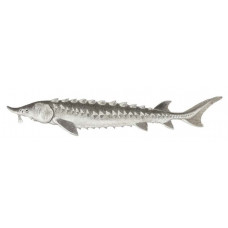Latin name
Acipenser oxyrinchus
Other names
Sturgeon, common sturgeon, sea sturgeon, Albany beef; French: esturgeon noir d’Amerique.
Identification
The Atlantic sturgeon is dark brown or olive green with a white belly. The head is elongated, with a long, flat snout and four barbs on the underside. Five rows of scales (bony scale-like plates) run the length of the body: one along the back, two on each side, and two on the belly. The centers of the scales along the back and sides are light, which makes them stand out against the darker surrounding color. These spines are located very close to each other, and the bases of most of them overlap each other.
Distribution
This species is distributed along the northwestern and western Atlantic coast of North America from the Hamilton River in Labrador, Canada, to northeastern Florida. It is currently more popular in the Hudson River, New York, than in other parts of its range, although its numbers there are low.
Habitat
Atlantic sturgeon's habitat is mainly estuaries and bays of large rivers, as well as deep river basins deep inland. In the ocean, it inhabits the shallow waters of the continental shelf.
Size
Atlantic sturgeon can live up to 60 years and reach a size of 14 feet. The largest known specimen is an 811-pounder. Fish over 200 pounds are rare today.
Life history and Behavior
Spawning migrations last from late winter to early summer. Despite its late maturity, it is highly fecund but has a low reproductive rate because females spawn only once every 3 to 5 years. Females only become sexually mature at the age of 7 to 10 years in the southernmost range and 22 to 28 years in the northernmost range. Tagging studies have shown that Atlantic sturgeon migrate extensively both north and south of their native river systems.
Food and feeding habits
Juveniles and adults feed as bottom scavengers, eating a variety of crustaceans, bivalve mollusks and worms, as well as insect larvae and small fish.
Reproduction
No information
| Classification | |
| Phylum | Chordata |
| Class | Actinopterygii |
| Squad | Acipenseriformes |
| Family | Acipenseridae |
| Genus | Acipenser |
| Species | A. oxyrinchus |
| Features | |
| Conservation status | Vulnerable |
| Habitat | Pelagic |
| Life span, years | 60 |
| Maximum body weight, kg | 360 |
| Maximum length, cm | 460 |
| Sailing speed, m/s | No information |
| Threat to people | Edible |
| Way of eating | Predator |




